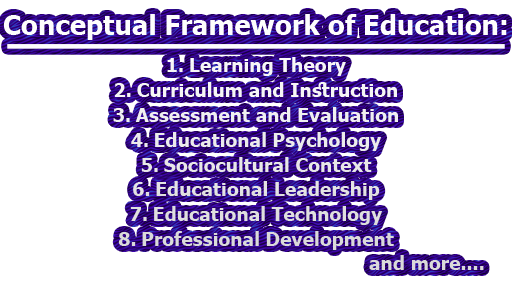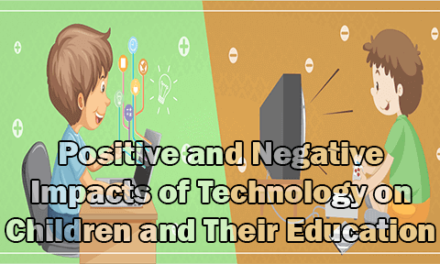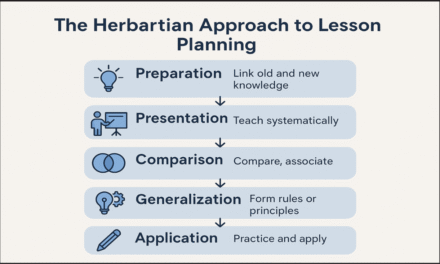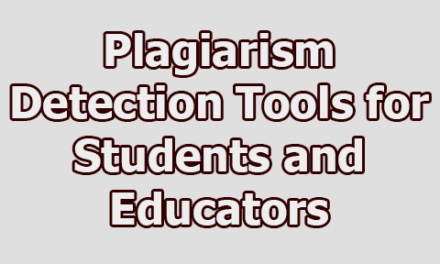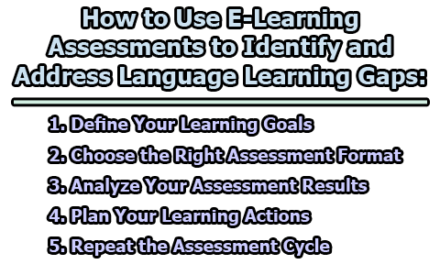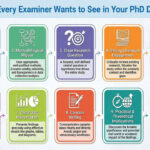Conceptual Framework of Education:
The conceptual framework of education refers to the underlying principles, theories, and concepts that guide educational practices and policies. It serves as a roadmap for educators, policymakers, and researchers to understand how learning occurs, how to design effective instruction, and how to improve educational outcomes. The following is an overview of the key components of the conceptual framework of education:
1. Learning Theory: Learning theory refers to the study of how people learn and acquire new knowledge and skills. The theories of behaviorism, cognitivism, and constructivism are among the most widely used in education. Behaviorism emphasizes the role of reinforcement in shaping behavior, cognitivism focuses on how information is processed in the brain, and constructivism emphasizes the active construction of knowledge by learners.
2. Curriculum and Instruction: Curriculum and instruction refer to the content and methods used to teach specific subjects. Curriculum design involves identifying the goals and objectives of instruction, selecting appropriate materials and resources, and creating assessments to measure student learning. Instructional methods may include lectures, discussions, hands-on activities, and technology-based learning.
3. Assessment and Evaluation: Assessment and evaluation refer to the methods used to measure student learning and evaluate the effectiveness of instruction. Assessment can take many forms, including standardized tests, performance-based assessments, and self-assessments. Evaluation involves using the data collected from assessments to make informed decisions about instruction and curriculum.
4. Educational Psychology: Educational psychology is the study of how individuals learn and develop within educational settings. It includes the study of human development, motivation, and individual differences. Educational psychologists may conduct research on topics such as learning disabilities, classroom management, and instructional design.
5. Sociocultural Context: The sociocultural context of education refers to the broader social, cultural, and political factors that shape educational practices and policies. This includes factors such as race, ethnicity, socioeconomic status, and language. Understanding the sociocultural context of education is critical for ensuring that educational practices and policies are equitable and inclusive.
6. Educational Leadership: Educational leadership refers to the management and administration of educational institutions. Effective educational leaders must have strong communication and organizational skills, as well as the ability to make informed decisions based on data and research.
7. Educational Technology: Educational technology refers to the use of technology to enhance teaching and learning. This includes the use of computers, mobile devices, and educational software to support instruction and assessment.
8. Professional Development: Professional development refers to the ongoing training and development of educators. This may include workshops, conferences, and other opportunities for educators to learn new skills and stay current with developments in their field.
9. Diversity and Inclusion: Diversity and inclusion refer to the recognition and celebration of the diversity of individuals and communities, as well as the need to create inclusive educational environments that respect and value differences. This includes addressing issues of bias, discrimination, and marginalization in educational settings.
10. Teacher Education: Teacher education refers to the preparation of individuals to become effective educators. This includes both pre-service and in-service training, as well as ongoing professional development. Effective teacher education programs should provide a strong foundation in subject matter, pedagogy, and educational theory.
11. Family and Community Engagement: Family and community engagement refer to the involvement of families and community members in the educational process. This includes promoting communication between schools and families, as well as involving community members in school decision-making processes.
12. Global Perspectives: Global perspectives refer to the recognition of the interconnectedness of the world and the need to prepare learners to be global citizens. This includes promoting cross-cultural understanding, encouraging international collaborations, and addressing global issues such as climate change and poverty.
13. Ethics and Values: Ethics and values refer to the principles and beliefs that guide educational practices and policies. This includes issues such as academic integrity, social responsibility, and respect for diversity. Educators must be aware of the ethical and value-based considerations that underlie their work.
14. Research and Evaluation: Research and evaluation refer to the systematic study of educational practices and policies. This includes both qualitative and quantitative research methods, as well as the use of data to inform decision-making. Effective educational research and evaluation should be rigorous, transparent, and ethical.
15. Policy and Governance: Policy and governance refer to the development and implementation of educational policies at the local, state, and national levels. This includes issues such as funding, accountability, and regulation. Effective educational policies and governance should be evidence-based, equitable, and transparent.
16. Neuroscience and Education: Neuroscience and education refer to the study of how the brain processes information and how this knowledge can inform educational practices. This includes research on topics such as brain development, memory, and attention. Understanding the relationship between neuroscience and education can lead to the development of more effective instructional strategies.
17. Equity and Access: Equity and access refer to the recognition of the need to ensure that all learners have access to high-quality educational opportunities regardless of their background or circumstances. This includes addressing issues of poverty, race, and disability, as well as promoting access to resources such as technology and high-quality teachers.
18. Lifelong Learning: Lifelong learning refers to the recognition of the need for individuals to continue learning throughout their lives. This includes promoting adult education, vocational training, and other forms of continuing education. Effective lifelong learning programs should be flexible, relevant, and accessible.
19. Interdisciplinary Approaches: Interdisciplinary approaches refer to the recognition of the interconnectedness of different fields and the need to incorporate multiple perspectives in educational practices and policies. This includes integrating different subject areas, as well as promoting collaborations between educators, policymakers, and researchers.
20. Future Trends: Future trends refer to the recognition of the need to anticipate and adapt to changing educational needs and technologies. This includes issues such as the use of artificial intelligence, personalized learning, and virtual reality in education. Understanding future trends can help educators and policymakers prepare for the challenges and opportunities of the future.
In summary, the conceptual framework of education is a complex and dynamic system that encompasses a wide range of theories, principles, and practices. By understanding the key components of this framework and their interrelationships, educators, policymakers, and researchers can work together to create effective and equitable education systems that meet the needs of all learners.

Library Lecturer at Nurul Amin Degree College

